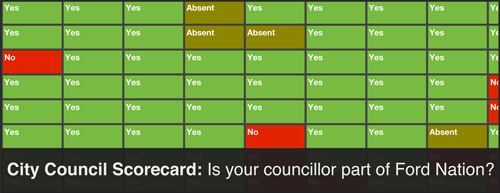Let’s play compare and contrast.
Here’s the Toronto Star’s Paul Moloney, on a recently discovered surplus found on the city’s 2010 books:
The final tally of the city’s books shows there’s an extra $88 million available to reduce next year’s budget gap.
The year-end report for 2010 shows higher revenues and lower costs than had been projected in September.
City finance staff are recommending that the $88 million be used to reduce the $774 million hole in the 2012 operating budget rather than put the money into capital repairs.
via City ended 2010 with $88M surplus – thestar.com.
Now here’s Royson James, writing for the same paper, in March 2010, criticizing Mayor David Miller for announcing that the city had discovered an approximately 100 million dollar surplus on the city’s 2009 books:
But it raises many questions about how the city manages our money – it seems able to “find†massive sums of cash, almost on demand, while crying poor.
Surpluses are obviously better than deficits – cities can’t run a deficit, by law – but budget integrity suggests you levy the amount of money you need to run city services. And if you took more than you needed, maybe you give it back, not continue to raise taxes.
via James: How did a city that’s broke find $100 million? – thestar.com.
Around the same time, the National Post’s Natalie Alcoba interviewed a number of Miller’s council opponents, who piled on the bandwagon that claimed a discovered budgetary surplus indicates poor fiscal management:
“I’m still trying to get my head around the whole notion of finding $100-million,†said Councillor Michael Thompson (Scarborough Centre).
…
“The credibility of the budget is worn fairly thin. I worry by the time it reaches council they will have found more money under the sofas and desks at City Hall,†said Councillor Brian Ashton (Scarborough Southwest).
via Analysis: The looming battle over David Miller’s $105-million surplus – Posted Toronto.
And the venerable Toronto Sun’s Antonella Artuso talked to the mayoral candidates, who at the time were mostly all pretending to be right-wing budget hawks — not yet understanding that the real key to success as a right-wing budget hawk candidate is repetitive slogans and yelling –, getting more of the same type of reaction:
“That means one of two things – that they overtaxed us or they’re incompetent and don’t understand how to do math,” candidate Rocco Rossi said of the shifting surplus.
…
“He will not be the mayor then… now he’s making next year’s budget on the back of an envelope, the same envelope that he’s used to figure out this year’s budget,” Smitherman said.
…
Councillor John Parker said it’s always nice to find money but he wondered why city finance officials didn’t know about it.
“I see that as nothing to be proud of,” he said.
via Miller playing budget games: Critics | Toronto Sun.
Of course anyone who takes a second to think about it understands why these surpluses happen. The city’s budget is, in many cases, little more than a collection of informed estimates. They estimate how many people will ride the TTC, how much fuel the city will use, what the cost of building materials will be, and so on. Plus, revenues from the land transfer tax are highly variable; the city has no way of accurately knowing how many homes will sell in the city in any given year. Essentially, they just guess.
The difference between this year and last year, of course, is that where Miller made a big show of announcing the surplus at a media event, Ford hasn’t gone on record with a comment about this year’s extra money. You have to assume this is largely because he can’t take credit for a 2010 budgetary surplus. This was forged before he was mayor.
Still, though, I wonder if the same critics will continue to throw barbs should this sort of thing continue into the coming budget year.
Related: Not all budgetary news is good. The TTC is facing a shortfall of at least $39 million. Steve Munro has an excellent analysis of the numbers. It would appear that we’re cruising toward a fare increase. And those promised increases in service we were promised following the recent route cuts? Don’t hold your breath.

